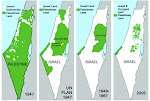Political Implications of Palestinians in UNESCO
On Monday, the United Nations Education, Scientific and Cultural Organisation (UNESCO) voted overwhelmingly to admit the Palestinian Authority as a full member -- an accession typically reserved for independent sovereign nations.
Both the United States and Israel had strongly opposed the measure, which was tied to the PA's overall strategy of seeking statehood unilaterally at the UN Security Council. UNESCO's admission of the PA at this stage, the US State Department said, was both premature and counterproductive to a permanent resolution of the Palestinian-Israeli conflict.
The US, which donates more than a fifth of UNESCO's annual budget, has already announced that it will cut $60 million of aid this month as a penalty. Israel, meanwhile, has announced that its response to the accession will be to fast-track the construction of 2,000 new residences in settlements in the West Bank and East Jerusalem.
Today, The Henry Jackson Society releases a strategic briefing, "Political Implications of the Palestinian Accession to UNESCO," co-written byMichael Weiss and Houriya Ahmed, assessing the background to this historic vote, what it means for the future of the cultural agency, the pursuit of American interests abroad and why, exactly, Israel is wary of PA membership.
Here's a summary of the report:
A diplomatic victory for the Palestinian Authority
- Admission into UNESCO is a public relations victory for the PA and a deliberate tactic of isolating countries opposed to its statehood bid at the UN Security Council-namely, the US and Israel.
- The move is part of the PA's campaign to join independent UN agencies as full members in order to create a moral and political momentum for its statehood recognition. As such, the popular support received for membership in UNESCO will make it harder for countries to oppose the statehood bid.
- As a UNESCO member, the PA can-and has indicated that it will-apply for World Heritage classification for historic sites of cultural significance in the Occupied Territories. This would include landmarks which Israel has officially declared part of its national heritage, and which could complicate future final status negotiations.
Implications for Israel
- Israel's response to UNESCO membership was negative. Israel views the PA's statehood gambit as a violation of mutually agreed upon parameters for peace negotiations and is considering "cutting all ties" and taking punitive measures against the PA, and is re-considering its ties with UNESCO.
- Israel no doubt fears that UNESCO's ability to categorise World Heritage sites will be exploited by the PA to claim ownership over contested religious and cultural landmarks in both the West Bank and East Jerusalem.
Implications for the United States
- The US rejected the UNESCO bid and has stated that the move "undermines" international efforts in trying to achieve peace in the Middle East. The US State Department announced that it would withhold $60 million in financial support due to be given to UNESCO this month-nearly a fifth of its yearly budget.
- Despite financial cuts, the US has emphasised that its membership is not in question. UNESCO is valuable for American business and national security interests in developing countries.
Implications for UNESCO
- Unless the shortfall is made up by other donors, the closure of UNESCO operations around the world may be likely because of cuts in US aid.
- With its strong commitment to freedom of expression and information, UNESCO may come under renewed criticism for its inclusion of the PA, which has a history of curbing journalistic freedoms in the West Bank and Gaza. If UNESCO fails to hold the PA to the same ethical standards as other members, the agency could be accused of double standards.
Hat tip to the Henry Jackson Society for this guest post.
Both the United States and Israel had strongly opposed the measure, which was tied to the PA's overall strategy of seeking statehood unilaterally at the UN Security Council. UNESCO's admission of the PA at this stage, the US State Department said, was both premature and counterproductive to a permanent resolution of the Palestinian-Israeli conflict.
The US, which donates more than a fifth of UNESCO's annual budget, has already announced that it will cut $60 million of aid this month as a penalty. Israel, meanwhile, has announced that its response to the accession will be to fast-track the construction of 2,000 new residences in settlements in the West Bank and East Jerusalem.
Today, The Henry Jackson Society releases a strategic briefing, "Political Implications of the Palestinian Accession to UNESCO," co-written byMichael Weiss and Houriya Ahmed, assessing the background to this historic vote, what it means for the future of the cultural agency, the pursuit of American interests abroad and why, exactly, Israel is wary of PA membership.
Here's a summary of the report:
A diplomatic victory for the Palestinian Authority
- Admission into UNESCO is a public relations victory for the PA and a deliberate tactic of isolating countries opposed to its statehood bid at the UN Security Council-namely, the US and Israel.
- The move is part of the PA's campaign to join independent UN agencies as full members in order to create a moral and political momentum for its statehood recognition. As such, the popular support received for membership in UNESCO will make it harder for countries to oppose the statehood bid.
- As a UNESCO member, the PA can-and has indicated that it will-apply for World Heritage classification for historic sites of cultural significance in the Occupied Territories. This would include landmarks which Israel has officially declared part of its national heritage, and which could complicate future final status negotiations.
Implications for Israel
- Israel's response to UNESCO membership was negative. Israel views the PA's statehood gambit as a violation of mutually agreed upon parameters for peace negotiations and is considering "cutting all ties" and taking punitive measures against the PA, and is re-considering its ties with UNESCO.
- Israel no doubt fears that UNESCO's ability to categorise World Heritage sites will be exploited by the PA to claim ownership over contested religious and cultural landmarks in both the West Bank and East Jerusalem.
Implications for the United States
- The US rejected the UNESCO bid and has stated that the move "undermines" international efforts in trying to achieve peace in the Middle East. The US State Department announced that it would withhold $60 million in financial support due to be given to UNESCO this month-nearly a fifth of its yearly budget.
- Despite financial cuts, the US has emphasised that its membership is not in question. UNESCO is valuable for American business and national security interests in developing countries.
Implications for UNESCO
- Unless the shortfall is made up by other donors, the closure of UNESCO operations around the world may be likely because of cuts in US aid.
- With its strong commitment to freedom of expression and information, UNESCO may come under renewed criticism for its inclusion of the PA, which has a history of curbing journalistic freedoms in the West Bank and Gaza. If UNESCO fails to hold the PA to the same ethical standards as other members, the agency could be accused of double standards.
Hat tip to the Henry Jackson Society for this guest post.





















No comments:
Post a Comment